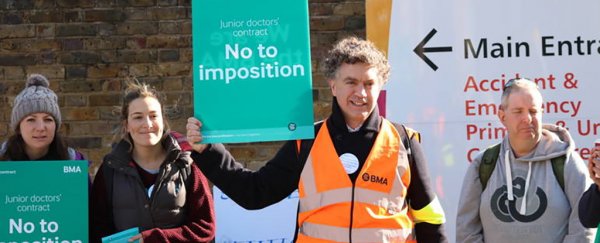England's National Health Service (NHS) is in turmoil after junior doctors went on strike for the second day running on Wednesday April 27. It's the first time a junior doctor strike has covered emergency rooms, intensive care, and maternity wards, as well as routine care.
Junior doctors - those working at the same time as completing their training - have called the unprecedented action over a proposed working contract put forward by the UK government and Health Secretary, Jeremy Hunt. The contract has been met with heavy criticism from those in the industry, with the British Medical Association (BMA) describing it as "unfair and damaging".
At the centre of the dispute is a change in 'standard' working hours to cover 7am to 10pm Saturdays and 7am to 10pm on weekdays. Currently, these hours only cover 7am to 7pm on weekdays, and any hours worked outside of these times pays extra.
The UK government says the additional hours will mean patients get a more consistent level of treatment at any time of the day or week, and is offering a 13.5 percent pay rise in return. The BMA says the changes will lead to overworked, overtired doctors, and insists the pay rise won't have any effect because of the reduction in overtime pay on Saturdays.

As you might expect, both sides are being accused of manipulating past statistics and future estimates to support their argument, but the junior doctors themselves are in no doubt about the issue: 78 percent of junior doctors scheduled to work during the strike - some 21,608 people - ended up joining the action on Tuesday April 26.
In the middle of the increasingly bitter dispute are the patients, but fortunately, the impact hasn't been too severe as yet. According to reports, senior doctors have been reassigned to cover their colleagues, while many people with less serious ailments have been advised to avoid emergency departments this week.
Junior doctors have agreed to call off the strike if a "major unpredictable event" should occur.
That said, tens of thousands of appointments and operations have been now postponed. Speaking to BBC Radio 4, one patient said she was "devastated" that her spinal procedure had been cancelled, but added she was "100 percent" behind the junior doctors strike.
Both Jeremy Hunt and senior BMA officials have that claimed the other side in the dispute is refusing to compromise. The BMA did suggest trialling the new contract arrangement at a limited number of hospitals to test its impact, but the idea was rejected by the government.
"If the government wants more seven-day services then, quite simply, it needs more doctors, nurses, and support staff, and the extra investment necessary to deliver them," said the chair of the BMA's junior doctor committee, Johann Malawana, as reported by The Guardian. "Rather than address these issues head on, the government wants to introduce a contract that is unfair and in which junior doctors have no confidence."
For the time being, there's no end in sight. Opinion polls quoted in reports show that 57-59 percent of the UK public support the striking doctors.
